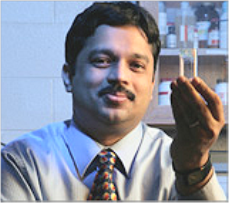School Seminar: Professor Srinivasa Raghavan; University of Maryland
Friday, 17 September 11:00am – 12:00pm
This seminar will be delivered via Zoom – Please email chemistry.researchsupport@sydney.edu.au for zoom link and password.
Speaker: Professor Srinivasa Raghavan; University of Maryland
Host: Dr Derrick Roberts
Title: Nature-Inspired ‘Smart’ Materials: Ability to Move, Morph, Explode and Heal
Abstract:
Our laboratory seeks to engineer the assembly of polymers, surfactants, and nanoparticles into micro- or nanostructured materials. We seek to create ‘smart’ or responsive materials whose properties can be transformed by an external stimulus. The inspiration for our work frequently comes from nature, and extends across the range of length scales.
- At the nanoscale, we study molecular self-assembly into structures such as vesicles and micelles. In addition, we have created self-assembling biopolymers that are able to convert liquid blood into a gel; thereby, these ‘hemostatic’ materials stop bleeding from serious injuries. This research has resulted in a commercial product called Rapid-Seal Wound Gel that is available at pharmacies across the country.
- At the microscale, we create polymeric capsules inspired by the architecture and properties of biological cells. Examples include: capsules with many inner compartments; capsules that can ‘swim’ in water in the presence of a chemical fuel; and capsules that can swell and explode, rapidly ejecting their internal content.
- At the macroscale, we are developing polymer hydrogels inspired by the responsive properties of plants and aquatic creatures. For example, we have designed gel sheets that roll up into tubes under a specific cue, and gel-membranes that allow water to flow only if it has a certain pH or temperature. We have also found that gels can be electroadhered to tissues, which may pave the way for surgeries without sutures.
Biography:
Srinivasa (Srini) Raghavan is the Patrick & Marguerite Sung Professor in the Department of Chemical & Biomolecular Engineering at the University of Maryland, College Park (UMD). He received his B.Tech. and Ph.D. in Chemical Engineering from the Indian Institute of Technology, Madras, and North Carolina State University, respectively. His research on self-assembly, nanostructured fluids, and soft materials has resulted in more than 180 publications and 20 U.S. patents, which have been cited more than 14,000 times (h-index of 69). At UMD, he has been recognized both for his teaching and his research, including being designated a Distinguished Scholar-Teacher in 2017. He has been a three-time nominee for a UMD Invention of the Year and won this award in 2009. He is also the scientific co-founder of three startup companies based on technologies invented in his laboratory.


